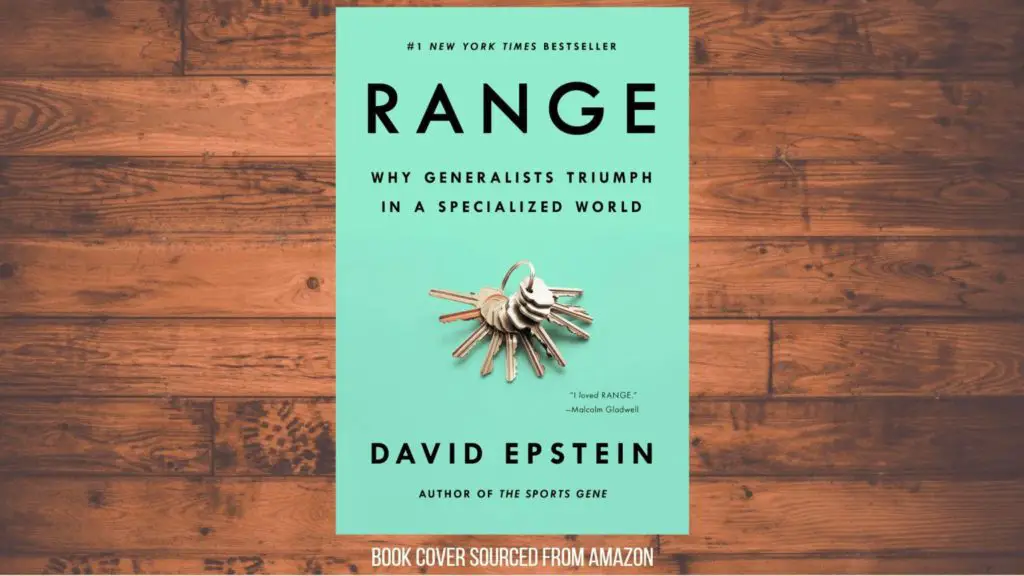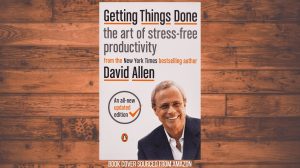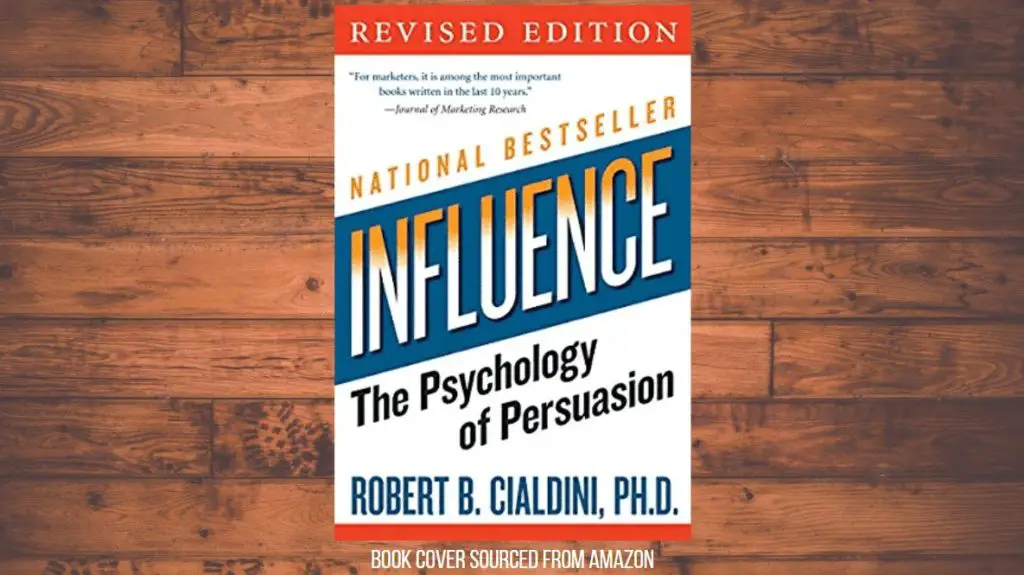This post may contain affiliate links, which means I’ll receive a commission if you purchase through my links, at no extra cost to you. Please read full disclosure for more information.
ABOUT
- Title: Range
- Sub-title: Why Generalists Triumph in a Specialized World
- Author: David Epstein
- About the author: In addition to Range, David Epstein also wrote the New York Times best seller The Sports Gene. He is a decorated writer who was previously a writer at Sports Illustrated and a science and investigative reporter at ProPublica. His writing has also been featured in a variety of organizations from disciplines such as science, engineering, medicine, and athletics. He has a master’s degree in environemental science and journalism.
- Pages: 352
- Published: 2019
- Link to book
HIGH-LEVEL SUMMARY
Range is a book that advocates for the generalists; the experimenters, the ones who are open-minded and willing to try many things. Author David Epstein studied the paths of success that the most accomplished athletes, artists, musicians, inventors, forecasters, and scientists took.
In today’s world, it seems like everyone is pushed to specialize as early as possible. Parents that want their kids to excel at a certain sport, activity, or musical instrument will put their kids in it at a young age. They’ll have them solely practice that activity through their childhood.
Epstein found that the most successful and innovative people actually followed a different path more often than not. These elite individuals tended to go through a “sampling period” where they tried a variety of things.
For an athlete, they may have played several sports growing up before settling on one and perfecting it. For a musician, they may have played several instruments before landing on one they loved and wanted to master.
Overall, Range will explain the dangers of overspecialization and how breadth can be valuable.
RECOMMENDATION
Range was incredibly insightful on pointing out the pros and cons of specialization vs. breadth.
I’d strongly recommend this to anyone for the benefit of their hobbies and/or profession. Understanding the benefits of sampling can help your overall improvement in learning and ability.
Many of the findings presented in the book are counterintuitive and I think everyone should be aware of them.
This book is great for business as well as parenting. If you are a parent or have friends and family that are younger than you, I believe the knowledge you’ll gain from this book can especially benefit them if you pass it on.
If you are a parent of a three-year-old, you may be at the stage of finding out what activities to put them in. What sports should they play? What instruments should they learn? What about art?
After reading Range, you’ll know that exposing your child to a variety of domains will likely benefit their overall development.
TOP 30 TAKEAWAYS
In no particular order
1. Tiger’s (Tiger Woods) incredible upbringing has been at the heart of a batch of bestselling books on the development of expertise, one of which was a parenting manual written by Tiger’s father, Earl.
2. We are often taught that the more competitive and complicated the world gets, the more specialized we all must become (and the earlier we must start) to navigate it.
3. When scientists examine the entire developmental path of athletes, from early childhood, it looks like this: Eventual elites typically devote less time early on to deliberate practice in the activity in which they will eventually become experts. Instead, they undergo what researchers call a “sampling period.” They play a variety of sports, usually in an unstructured or lightly structured environment; they gain a range of physical proficiencies from which they can draw; they learn about their own abilities and proclivities; and only later do they focus in and ramp up technical practice in one area.
4. One study showed that early career specializers jumped out to an earnings lead after college, but that later specializers made up for the head start by finding work that better fit their skills and personalities.
5. Many studies have showed how technological inventors increased their creative impact by accumulating experience in different domains, compared to peers who drilled more deeply into one; they actually benefited by proactively sacrificing a modicum of depth for breadth as their careers progressed.
6. An internationally renowned scientist told me that increasing specialization has created a “system of parallel trenches” in the quest for innovation. Everyone is digging deeper into their own trench and rarely standing up to look in the next trench over, even though the solution to their problem happens to reside there.
7. The challenge we all face is how to maintain the benefits of breadth, diverse experience, interdisciplinary thinking, and delayed concentration in a world that increasingly incentivizes, even demands, hyperspecialization.
8. In golf or chess, a ball or piece is moved according to rules and within defined boundaries, a consequence is quickly apparent, and similar challenges occur repeatedly. There are domains beyond chess in which massive amounts of narrow practice make for grandmaster-like intuition.
9. In wicked domains, the rules of the game are often unclear or incomplete, there may or may not be repetitive patterns and they may not be obvious, and feedback is often delayed, inaccurate, or both. When narrow specialization is combined with an unkind domain, the human tendency to rely on experience of familiar patterns can backfire horribly.
10. Compared to other scientists, Nobel laureates are at least twenty-two times more likely to partake as an amateur actor, dancer, magician, or other type of performer. Nationally recognized scientists are much more likely than other scientists to be musicians, sculptors, painters, printmakers, woodworkers, mechanics, electronics tinkerers, glassblowers, poets, or writers, of both fiction and nonfiction.
11. As psychologist and prominent creativity researcher Dean Keith Simonton observed, “rather than obsessively focus[ing] on a narrow topic,” creative achievers tend to have broad interests. The successful adapters were excellent at taking knowledge from one pursuit and applying it creatively to another, and at avoiding cognitive entrenchment.
12. Modern work demands knowledge transfer: the ability to apply knowledge to new situations and different domains. The ability to move freely, to shift from one category to another, is one of the chief characteristics of ‘abstract thinking.’”
13. Flynn was bemused to find that the correlation between the test of broad conceptual thinking and GPA was about zero. In Flynn’s words, “the traits that earn good grades at [the university] do not include critical ability of any broad significance.” “Even the best universities aren’t developing critical intelligence,” he told me. “They aren’t giving students the tools to analyze the modern world, except in their area of specialization. Their education is too narrow.”
14. The more constrained and repetitive a challenge, the more likely it will be automated, while great rewards will accrue to those who can take conceptual knowledge from one problem or domain and apply it in an entirely new one.
15. The ability to apply knowledge broadly comes from broad training. Breadth of training predicts breadth of transfer.
16. The psychologists highlighted the variety of paths to excellence, but the most common was a sampling period, often lightly structured with some lessons and a breadth of instruments and activities, followed only later by a narrowing of focus, increased structure, and an explosion of practice volume.
17. Kornell was explaining the concept of “desirable difficulties,” obstacles that make learning more challenging, slower, and more frustrating in the short term, but better in the long term.
18. Struggling to generate an answer on your own, even a wrong one, enhances subsequent learning. One of those desirable difficulties is known as the “generation effect.” Used for learning, testing, including self-testing, is a very desirable difficulty.
19. Another important desirable difficulty: “spacing,” or distributed practice. It is what it sounds like—leaving time between practice sessions for the same material. Space between practice sessions creates the hardness that enhances learning. Interleaving is a desirable difficulty that frequently holds for both physical and mental skills.
20. Analogical thinking takes the new and makes it familiar, or takes the familiar and puts it in a new light, and allows humans to reason through problems they have never seen in unfamiliar contexts.
21. Nike cofounder Phil Knight: “I feel sorry for the people who know exactly what they’re going to do from the time they’re sophomores in high school.” In his memoir, Knight wrote that he “wasn’t much for setting goals,” and that his main goal for his nascent shoe company was to fail fast enough that he could apply what he was learning to his next venture. He made one short-term pivot after another, applying the lessons as he went. “The people we study who are fulfilled do pursue a long-term goal, but they only formulate it after a period of discovery,” he told me.
22. Because personality changes more than we expect with time, experience, and different contexts, we are ill-equipped to make ironclad long-term goals when our past consists of little time, few experiences, and a narrow range of contexts.
23. Ibarra concluded that we maximize match quality throughout life by sampling activities, social groups, contexts, jobs, careers, and then reflecting and adjusting our personal narratives.“ Match quality” is a term economists use to describe the degree of fit between the work someone does and who they are—their abilities and proclivities.
24. “Knowledge is a double-edged sword. It allows you to do some things, but it also makes you blind to other things that you could do.” The more information specialists create, the more opportunity exists for curious dilettantes to contribute by merging strands of widely available but disparate information—undiscovered public knowledge, The larger and more easily accessible the library of human knowledge, the more chances for inquisitive patrons to make connections at the cutting edge.
25. Lateral thinking is a term coined in the 1960s for the reimagining of information in new contexts, including the drawing together of seemingly disparate concepts or domains that can give old ideas new uses.
26. Facing uncertain environments and wicked problems, breadth of experience is invaluable. Facing kind problems, narrow specialization can be remarkably efficient.
27. The best forecasters are high in active open-mindedness. They are also extremely curious, and don’t merely consider contrary ideas, they proactively cross disciplines looking for them. In wicked domains that lack automatic feedback, experience alone does not improve performance.
28. “A paradox of innovation and mastery is that breakthroughs often occur when you start down a road, but wander off for a ways and pretend as if you have just begun,” Lewis wrote.
29. In professional networks that acted as fertile soil for successful groups, individuals moved easily among teams, crossing organizational and disciplinary boundaries and finding new collaborators. Networks that spawned unsuccessful teams, conversely, were broken into small, isolated clusters in which the same people collaborated over and over.
30. Approach your own personal voyage and projects like Michelangelo approached a block of marble, willing to learn and adjust as you go, and even to abandon a previous goal and change directions entirely should the need arise.
WHAT I LIKED

Emphasized the importance of range/breadth for the modern world
Throughout the book you feel this emphasis on the fact that range is important in the modern world.
With the threat of automation making certain tasks or jobs irrelevant, it pays to have versatility and flexibility. It pays to have transferrable skills you can take with you wherever you go in your career.
Numerous examples of current and historical successful and innovative individuals
The book starts off by diving into the upbringing of Tiger Woods and Roger Federer to illustrate how one elite athlete was raised on specialization and another elite athlete went through a sampling phase before settling on one sport.
On top of this, you’ll read about many others including chess players, artists, intellects, musicians, and more. You’ll see how range played a critical part in the development and success of these figures.
Clearly defines the types of activities most appropriate for specialization vs. breadth
Specialization isn’t bad and the author makes that clear. It’s just that specialization is great for certain areas and horrible for others. In “kind” environments such as chess or golf, the rules and patterns of the game are known, so specializing can help one master these crafts.
In other areas such as economic forecasting or scientific discovery, the domain is “wicked.” The rigidity of specialized experience and thinking can prevent one from considering certain alternatives that can solve a problem.
This information will help the reader understand when specialization or breadth is appropriate.
BENEFITS TO YOUR LIFE AND CAREER

Gain experience and skills that can be transferred to other domains
If you implement what you read in Range, you’ll work to gain experience and skills that can be transferred across domains. You’ll realize the importance of doing this and the benefits it can bring you.
For you career, this can be valuable in providing you options to pivot and move laterally.
You’ll avoid pigeonholing yourself into one niche area that you are unable to get out of.
Learn to think outside of the box you are used to
It’s easy to specialize and become overlearned in one domain.
The book gives examples of certain medical professionals that are hyperspecialized in one area. Suddenly, everything they see can be solved through their specialty. A quote to visualize this is “when all you have is a hammer, everything looks like a nail.”
This book alone will bring awareness to that. But if you strive to have range, you’ll be able to think outside of the box. You’ll be able to pull from experience in different areas to help you solve whatever it is you are working on.
Have more fun and find meaning through sampling
Lastly, going through a sampling phase for music, education, or career will lead to more fun and a higher chance of finding meaning.
It’s unreasonable to think that we know how our whole life will go at a young age. Even in college, it’s tough to go into your freshman year to pick a major. A willingness to sample and experiment will be a fun process. You’ll get a taste test of everything on the menu.
By doing this, you are more likely to find match quality. When you take part in an activity with match quality, there is a good chance it will provide you with fulfillment.
12 ACTIONS YOU SHOULD TAKE
1. Sample a variety of activities, sports, careers, etc to learn about your own abilities and gain a range of proficiencies you can you can draw from.
2. Instead of jumping to specialize immediately, accumulate experience in different domains.
3. Stay open-minded about solutions that come from outside of your domain and expertise. Think of it as “having one foot outside your world.”
4. Identify if a task or skill uses a “kind” learning environment or if it is wicked. In a kind environment, pattern recognition works powerfully and there is immediate feedback. Facing kind problems, narrow specialization can be remarkably efficient. Facing uncertain environments and wicked problems, breadth of experience is invaluable.
5. Practice Fermi questions to help develop abstract thinking and critical intelligence. A little training in broad thinking strategies, like Fermi-izing, can go a long way, and can be applied across domains.
6. Think of how you can apply current knowledge to new problems. Learners become better at applying their knowledge to a situation they’ve never seen before, which is the essence of creativity.
7. When you are learning, you want it to be hard. Do this through desirable difficulties: testing yourself, the generation effect, spaced repetition, interleaving of practice.
8. Practice analogical thinking. Deep analogical thinking is the practice of recognizing conceptual similarities in multiple domains or scenarios that may seem to have little in common on the surface. Analogical thinking takes the new and makes it familiar.
9. Avoid the phenomenon of internal details. Imagine you’re asked to predict whether a particular horse will win a race. The more internal details you learn about any particular scenario—physical qualities of the specific horse, the background and strategy of the particular politician—the more likely you are to say that the scenario you are investigating will occur.
10. Aim to find match quality in what you do. Seth Godwin has said that “winners” often quit fast and quit often when they detect that a plan is not the best fit. Godwin was not advocating that one quit simply because a pursuit is difficult. Ibarra concluded that we maximize match quality throughout life by sampling activities, social groups, contexts, jobs, careers, and then reflecting and adjusting our personal narratives.
11. University of Utah professor Abbie Griffin studied “serial innovators.” Here were some traits found that you can strive to have: “high tolerance for ambiguity”; “systems thinkers”; “additional technical knowledge from peripheral domains”; “repurposing what is already available”; “adept at using analogous domains for finding inputs to the invention process”; “ability to connect disparate pieces of information in new ways”; “synthesizing information from many different sources”; “they appear to flit among ideas”; “broad range of interests”; “they read more (and more broadly) than other technologists and have a wider range of outside interests”; “need to learn significantly across multiple domains”; “Serial innovators also need to communicate with various individuals with technical expertise outside of their own domain.”
12. Learn how to “drop your tools.” Experienced groups became rigid under pressure and “regress to what they know best.” Doing what you know best can prevent you from finding new solutions. With overlearned behavior, you do the same thing in response to the same challenges over and over until the behavior has become so automatic that you no longer even recognize it as a situation-specific tool.
RESOURCES
Range can be found on Amazon at this link here if you are interested in reading.



